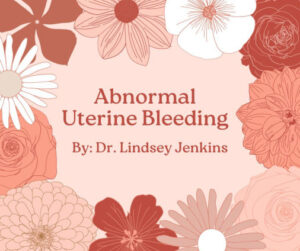 Dr. Jenkins here to talk about one of the most common issues we deal with as gynecologists- abnormal bleeding and periods! First, for reference the “normal” menstrual cycle is 24-38 days. This means it is considered normal if your period comes anywhere from 24 days apart to 38 days apart. Some women have very regular menstrual cycles with little variation in cycle length. Others may have more irregular cycles but if there is not more than a 10-day different between your shortest cycle and your longest cycle it is still considered “normal”. In other words, if one month your cycle was every 24 days and the next month it was every 34 days, this is still “normal”. If your periods come less than 24 days apart or more than 38 days apart consistently this may be abnormal, and it would be a good idea to come see us! The normal duration of bleeding is less than or equal to 8 days. What is “normal” in terms of amount of bleeding is dependent entirely on YOUR perception. If you do not feel your period is too heavy or too light, then it isn’t. If you are bothered by the amount of your bleeding, then it is time to see one our doctors to discuss it! Prolonged or heavy periods can result in anemia which can lead to symptoms of fatigue, dizziness, and headaches. If severe or sudden anemia develops this can require hospitalization and possibly blood transfusion.
Dr. Jenkins here to talk about one of the most common issues we deal with as gynecologists- abnormal bleeding and periods! First, for reference the “normal” menstrual cycle is 24-38 days. This means it is considered normal if your period comes anywhere from 24 days apart to 38 days apart. Some women have very regular menstrual cycles with little variation in cycle length. Others may have more irregular cycles but if there is not more than a 10-day different between your shortest cycle and your longest cycle it is still considered “normal”. In other words, if one month your cycle was every 24 days and the next month it was every 34 days, this is still “normal”. If your periods come less than 24 days apart or more than 38 days apart consistently this may be abnormal, and it would be a good idea to come see us! The normal duration of bleeding is less than or equal to 8 days. What is “normal” in terms of amount of bleeding is dependent entirely on YOUR perception. If you do not feel your period is too heavy or too light, then it isn’t. If you are bothered by the amount of your bleeding, then it is time to see one our doctors to discuss it! Prolonged or heavy periods can result in anemia which can lead to symptoms of fatigue, dizziness, and headaches. If severe or sudden anemia develops this can require hospitalization and possibly blood transfusion.
There are many reasons periods or bleeding may be abnormal. These include but are not limited to recent weight changes (gain or loss), thyroid dysfunction, age, underlying bleeding disorder, uterine polyps or fibroids, ovarian cysts, PCOS and cancer. There are many treatments for abnormal periods or bleeding. These include lifestyle changes to facilitate weight loss or gain, medications including non-hormonal and hormonal therapies and surgical options such as endometrial ablation or hysterectomy. The various forms of birth control are frequently used to help with abnormal bleeding, but many other options are available! If you are experiencing abnormal bleeding or periods, please schedule an appointment with our office so we may determine the cause and provide options for treatment!
We are accepting new patients! To schedule an appointment with OBGYN Associates, call us at 515-288-3287.
DISCLAIMER: All information on this website is provided for informational purposes only and is not intended to be construed as medical advice. OBGYN Associates shall not be liable for any errors or inaccuracies contained herein, or any actions taken in reliance thereon.

Dr. Jenkins here to talk about one of the most common issues we deal with as gynecologists- abnormal bleeding and periods! First, for reference the “normal” menstrual cycle is 24-38 days. This means it is considered normal if your period comes anywhere from 24 days apart to 38 days apart. Some women have very regular menstrual cycles with little variation in cycle length. Others may have more irregular cycles but if there is not more than a 10-day different between your shortest cycle and your longest cycle it is still considered “normal”. In other words, if one month your cycle was every 24 days and the next month it was every 34 days, this is still “normal”. If your periods come less than 24 days apart or more than 38 days apart consistently this may be abnormal, and it would be a good idea to come see us! The normal duration of bleeding is less than or equal to 8 days. What is “normal” in terms of amount of bleeding is dependent entirely on YOUR perception. If you do not feel your period is too heavy or too light, then it isn’t. If you are bothered by the amount of your bleeding, then it is time to see one our doctors to discuss it! Prolonged or heavy periods can result in anemia which can lead to symptoms of fatigue, dizziness, and headaches. If severe or sudden anemia develops this can require hospitalization and possibly blood transfusion.
There are many reasons periods or bleeding may be abnormal. These include but are not limited to recent weight changes (gain or loss), thyroid dysfunction, age, underlying bleeding disorder, uterine polyps or fibroids, ovarian cysts, PCOS and cancer. There are many treatments for abnormal periods or bleeding. These include lifestyle changes to facilitate weight loss or gain, medications including non-hormonal and hormonal therapies and surgical options such as endometrial ablation or hysterectomy. The various forms of birth control are frequently used to help with abnormal bleeding, but many other options are available! If you are experiencing abnormal bleeding or periods, please schedule an appointment with our office so we may determine the cause and provide options for treatment!
We are accepting new patients! To schedule an appointment with OBGYN Associates, call us at 515-288-3287.
DISCLAIMER: All information on this website is provided for informational purposes only and is not intended to be construed as medical advice. OBGYN Associates shall not be liable for any errors or inaccuracies contained herein, or any actions taken in reliance thereon.





Leave A Comment